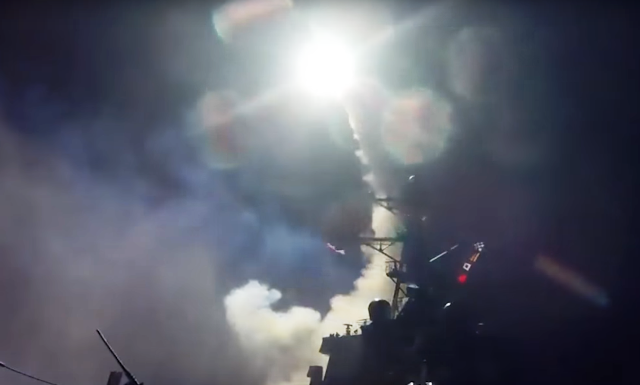Why the Syrian Missile Strike is Trump’s Best Decision So Far
May 9, 2017
On Tuesday, April 4, Syrian government planes killed dozens of people in a sarin gas attack on the town of Khan Sheikhoun in Idlib. Two days later, the US responded in a surprising way: actually punishing Syrian President Bashar al-Assad. The USS Ross and USS Porter launched 59 tomahawk missiles onto the Shayrat Air Base, where the airplanes that carried out the chemical weapons attack were based. Those missiles sent a clear message to Damascus, a message that years of diplomatic wrangling and “condemnations” from Western capitals couldn’t convey: don’t use chemical weapons again.
The Assad regime has engaged in a number of aggressive acts of terror to demoralize its opponents. Since the Syrian Civil War began, the United States has given the silent green light on the regime’s bloody tactics by doing nothing to stop them from happening. Indeed, it has become something of a trope that the US and its allies will condemn an atrocity whilst doing nothing meaningful about it. Take the case of the 2013 Ghouta chemical weapons attack, in which the Assad regime used sarin to kill hundreds of innocents. In the days following the attack, there were fears that the US would respond militarily. Visions of another Iraq War – another long, bloody slog for no real gain – scared the American public, and for good reason. Even then, Syria was a quagmire. President Barack Obama, who warned of a “red line” on poison gas a year before, acted to keep America out of war. After negotiations, Assad agreed to give up his poisons and sign the Chemical Weapons Convention.
It’s clear now that Assad has not given up his chemical weapons. For crossing Obama’s red line, Assad faced virtually no consequences.
This has had the effect of amplifying the demoralizing effect of Assad’s war crimes; “human rights” don’t matter here. Don’t expect America to save you. After the Iraq War, it has become customary for the international community to do very little when faced with a crisis like the one in Ghouta in 2013 and Khan Sheikhoun in 2017. Thus, it came as a shock that Donald Trump, a supposed non-interventionist who announced that removing Assad from power was no longer a major US foreign policy goal, signed off on such a forceful, aggressive measure. However, it is by far the smartest decision to come out of the Trump White House so far. The strike signaled to Assad that the US is no longer going to sit idly by and allow him to commit war crimes against his own people.
The foreign policy that dominated the Obama administration suffered from the American public’s unwillingness to get involved in yet another foreign quagmire like the one in Iraq. Indeed, this reluctance inspired a policy of avoiding direct military confrontation whilst funding local groups to do America’s dirty work for it. When it came to dealing with hostile regimes around the world, the Obama administration focused on negotiating and signing deals in place of meaningfully standing up for US interests. The chemical weapons agreement with Assad in Syria is one of said deals. The agreement with Iran concerning its nuclear program is another. Ultimately, the US agreed to these deals with no meaningful way to enforce their terms. Assad knew perfectly well that America wasn’t going to do anything if he gassed more people; that’s why Obama rushed to the negotiating table as quickly as he did. The White House’s reluctance to act is how hostile world leaders get away with making empty promises, showing the world America’s impotence in the process.
Like Trump or not, it’s hard to find fault in the decision to show Assad that actions have consequences. In the American public consciousness, there seem to be two extremes in foreign policy: impotent surrender and bullish hyper-aggression. There is a wide chasm between those extremes, a chasm that the American people shouldn’t be afraid to explore.
http://www.bbc.co.uk/news/amp/39450570













